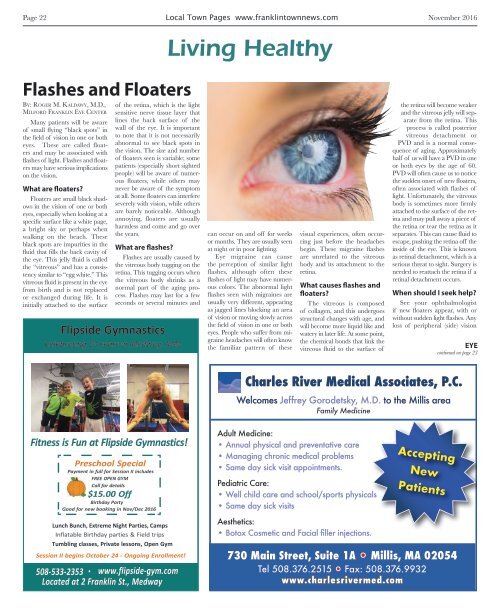Franklin November 2016
Franklin November 2016
Franklin November 2016
You also want an ePaper? Increase the reach of your titles
YUMPU automatically turns print PDFs into web optimized ePapers that Google loves.
Page 22 Local Town Pages www.franklintownnews.com <strong>November</strong> <strong>2016</strong><br />
Living Healthy<br />
Flashes and Floaters<br />
By: Roger M. Kaldawy, M.D.,<br />
Milford <strong>Franklin</strong> Eye Center<br />
Many patients will be aware<br />
of small flying “black spots” in<br />
the field of vision in one or both<br />
eyes. These are called floaters<br />
and may be associated with<br />
flashes of light. Flashes and floaters<br />
may have serious implications<br />
on the vision.<br />
What are floaters?<br />
Floaters are small black shadows<br />
in the vision of one or both<br />
eyes, especially when looking at a<br />
specific surface like a white page,<br />
a bright sky or perhaps when<br />
walking on the beach. These<br />
black spots are impurities in the<br />
fluid that fills the back cavity of<br />
the eye. This jelly fluid is called<br />
the “vitreous” and has a consistency<br />
similar to “egg white.” This<br />
vitreous fluid is present in the eye<br />
from birth and is not replaced<br />
or exchanged during life. It is<br />
initially attached to the surface<br />
of the retina, which is the light<br />
sensitive nerve tissue layer that<br />
lines the back surface of the<br />
wall of the eye. It is important<br />
to note that it is not necessarily<br />
abnormal to see black spots in<br />
the vision. The size and number<br />
of floaters seen is variable; some<br />
patients (especially short sighted<br />
people) will be aware of numerous<br />
floaters, while others may<br />
never be aware of the symptom<br />
at all. Some floaters can interfere<br />
severely with vision, while others<br />
are barely noticeable. Although<br />
annoying, floaters are usually<br />
harmless and come and go over<br />
the years.<br />
What are flashes?<br />
Flashes are usually caused by<br />
the vitreous body tugging on the<br />
retina. This tugging occurs when<br />
the vitreous body shrinks as a<br />
normal part of the aging process.<br />
Flashes may last for a few<br />
seconds or several minutes and<br />
Flipside Gymnastics<br />
Celebrating 23 years in Medway, MA!<br />
can occur on and off for weeks<br />
or months. They are usually seen<br />
at night or in poor lighting.<br />
Eye migraine can cause<br />
the perception of similar light<br />
flashes, although often these<br />
flashes of light may have numerous<br />
colors. The abnormal light<br />
flashes seen with migraines are<br />
usually very different, appearing<br />
as jagged lines blocking an area<br />
of vision or moving slowly across<br />
the field of vision in one or both<br />
eyes. People who suffer from migraine<br />
headaches will often know<br />
the familiar pattern of these<br />
visual experiences, often occurring<br />
just before the headaches<br />
begin. These migraine flashes<br />
are unrelated to the vitreous<br />
body and its attachment to the<br />
retina.<br />
What causes flashes and<br />
floaters?<br />
The vitreous is composed<br />
of collagen, and this undergoes<br />
structural changes with age, and<br />
will become more liquid like and<br />
watery in later life. At some point,<br />
the chemical bonds that link the<br />
vitreous fluid to the surface of<br />
the retina will become weaker<br />
and the vitreous jelly will separate<br />
from the retina. This<br />
process is called posterior<br />
vitreous detachment or<br />
PVD and is a normal consequence<br />
of aging. Approximately<br />
half of us will have a PVD in one<br />
or both eyes by the age of 60.<br />
PVD will often cause us to notice<br />
the sudden onset of new floaters,<br />
often associated with flashes of<br />
light. Unfortunately, the vitreous<br />
body is sometimes more firmly<br />
attached to the surface of the retina<br />
and may pull away a piece of<br />
the retina or tear the retina as it<br />
separates. This can cause fluid to<br />
escape, pushing the retina off the<br />
inside of the eye. This is known<br />
as retinal detachment, which is a<br />
serious threat to sight. Surgery is<br />
needed to reattach the retina if a<br />
retinal detachment occurs.<br />
When should I seek help?<br />
See your ophthalmologist<br />
if new floaters appear, with or<br />
without sudden light flashes. Any<br />
loss of peripheral (side) vision<br />
EYE<br />
continued on page 23<br />
Charles River Medical Associates, P.C.<br />
Welcomes Jeffrey Gorodetsky, M.D. to the Millis area<br />
Family Medicine<br />
Adult Medicine:<br />
• Annual physical and preventative care<br />
• Managing chronic medical problems<br />
• Same day sick visit appointments.<br />
Pediatric Care:<br />
• Well child care and school/sports physicals<br />
• Same day sick visits<br />
Accepting<br />
New<br />
Patients<br />
Lunch Bunch, Extreme Night Parties, Camps<br />
Aesthetics:<br />
• Botox Cosmetic and Facial filler injections.<br />
730 Main Street, Suite 1A • Millis, MA 02054<br />
Tel 508.376.2515 • Fax: 508.376.9932<br />
www.charlesrivermed.com

















